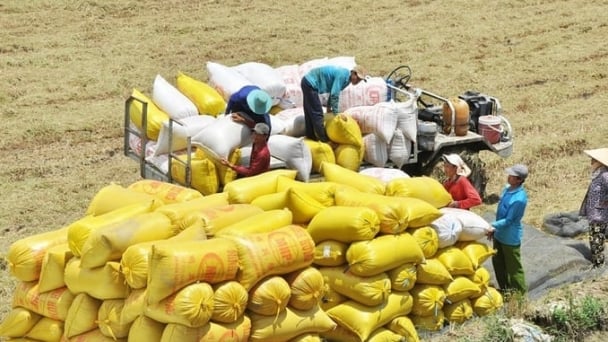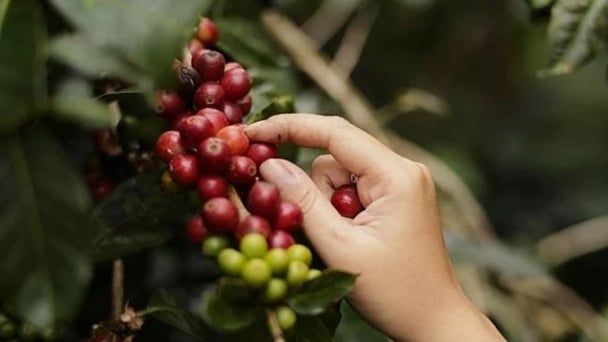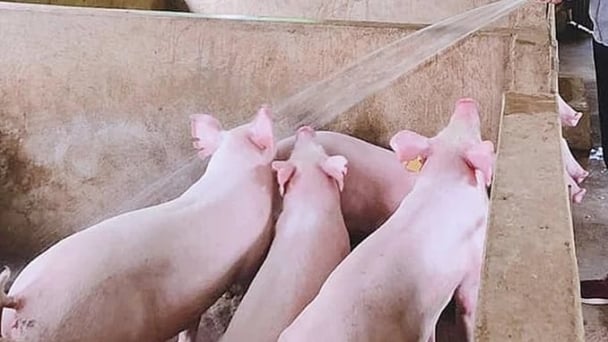May 27, 2025 | 22:05 GMT +7
May 27, 2025 | 22:05 GMT +7
Hotline: 0913.378.918
May 27, 2025 | 22:05 GMT +7
Hotline: 0913.378.918
According to the latest data from the Vietnam Food Association (VFA), closing the session on May 30, Vietnam's 5% broken rice price continued to decrease by USD 4 compared to the previous session, down to USD 574/ton. This is the lowest price among the world's leading rice-exporting countries.
Recorded at the same time, Thailand's similar rice price was USD 620/ton and Pakistan's price was USD 593/ton, USD 46/ton and USD 19/ton higher than Vietnam's rice price, respectively.
If compared with May 21, the time when the Indonesian National Logistics Agency (Bulog) announced the bid opening results, the price of 5% broken rice exported from Vietnam has decreased by about USD 15/ton in less than half a month.
This is also the bid opening session where Vietnam's Loc Troi Group Joint Stock Company won the bid by offering the lowest price compared to international competitors. Among the 11 shipments of rice equivalent to 300,000 tons that Bulog called for bids, the Vietnamese business offered the lowest price of USD 564.5/ton.
Meanwhile, the highest price of USD 658.5/ton came from Thai businesses. The bid prices of Myanmar and Pakistani businesses were USD 621.5/ton and USD 633/ton, respectively.
Thus, it can be seen that the difference is over 90 USD/ton between the lowest bid price of the Vietnamese business and its competitors. And even compared to the export rice price announced by the Vietnam Food Association (VFA), Loc Troi's price is up to USD 25/ton lower.
Loc Troi Group later affirmed that the export rice price of the order to Indonesia was carefully calculated, ensuring that the Group is profitable and harmonizing the benefits of farmers, market benefits, and the benefits of Vietnamese agricultural products in the long term.
However, some businesses in the industry and even the management agency, the Agency of Foreign Trade (Ministry of Industry and Trade), also expressed concern, saying that the above-mentioned act of exporting rice at low prices may have violated the competition law.
At a meeting between the Ministry of Industry and Trade and the Ministry of Agriculture and Rural Development a few days ago, in response to concerns about unfair price competition from businesses, VFA made a proposal to re-apply a floor price for rice exports. VFA hopes that applying the floor price will prevent the phenomenon of businesses competing unfairly on price, thereby ensuring the value of Vietnamese rice grains.
In fact, this proposal was also raised by VFA last year. However, some experts and large businesses in the industry immediately objected strongly because they assumed that this was unreasonable and did not follow market principles.
The argument mentioned is that Vietnam's export rice price always fluctuates according to the world market, so setting a floor price at one time will not be close to reality. This should be left to businesses to self-calculate, negotiate, and sell rice at appropriate prices.
According to Mr. Truong Sy Ba, Chairman of Tan Long Group, the floor price will have no value when the international market price is higher than this level. In case the international market price is lower than the floor price, market demand will look to buy rice from countries with better prices, such as Thailand, Pakistan, Myanmar, India, etc., and invisibly, Vietnamese rice will not be exportable.
At that time, the floor price will act as a barrier, prohibiting exports. Thus, making it impossible for farmers to sell their goods, domestic rice prices will plummet. In fact, this story happened many years ago, after which it was forced to remove floor prices.
According to the leader of VFA, Vietnam's rice exporting businesses have a habit of signing contracts with foreign countries before purchasing domestic rice to fulfill the contract. This caused them not to promptly respond when the price of domestically purchased rice increased highly and faster than the price the business had signed.
Therefore, when there is a fluctuation in the highly increased rice price, businesses are forced to renegotiate delivery times with partners, leading to increased transportation and delivery costs throughout the chain and contributing to increased losses.
Theoretically, the business has the right to self-decide the selling price. However, for managers and for an entire industry, there are many stories to worry about.
According to experts, if a few businesses, due to financial pressure, have to sell rice at low prices, it will easily "dump" the market, dragging down the entire industry's base level. When importers look at that low price as a reference, it will be very difficult for other businesses to sell at a higher price.
And if the above situation of "big sale" is repeated many times, in the long term, it will affect the income of farmers and the whole value chain of an industry.
At the recent meeting between the Ministry of Industry and Trade and the Ministry of Agriculture and Rural Development, Minister Le Minh Hoan frankly pointed out that we are currently exporting a product of a business, not a product of an industry. Linkage and cooperation are inherent weaknesses of businesses.
"It needs to be emphasized that our export of Vietnamese rice is about the image of Vietnamese rice, the image of Vietnamese agricultural products, not just about the rice of a certain rice business. Only then can Vietnamese agricultural products grow," said the Minister.
Minister Le Minh Hoan also noted that it is necessary to completely change the thinking and working methods of associations and unions. Because only when businesses and industry associations change their thinking from buying and selling to linkage and cooperation can they enhance the strength of a commodity industry and increase the competitiveness of products when entering the international market.
Translated by Thu Huyen

(VAN) Rice prices on May 27, 2025, show no new changes for both paddy and milled rice. Meanwhile, Vietnam’s export rice prices continue to remain flat.

(VAN) Pepper prices on May 27, 2025, recorded a slight increase in Indonesia, while domestic prices remain stable, trading at VND 146,000 to VND 147,000/kg.

(VAN) Rubber prices on May 27, 2025, are fluctuating sharply today. Domestic latex prices continue to trade around the range of VND 397 to VND 462/TSC.

(VAN) Coffee prices on May 27, 2025, continue to remain flat. Domestic coffee market is still trading around the range of VND 122,000 to VND 122,500/kg.

(VAN) Coffee prices on May 26, 2025, remain unchanged. Currently, the domestic coffee market is trading around VND 122,000 to VND 122,500/kg.

(VAN) Rubber prices on May 26, 2025, are declining. Domestically, latex prices remain stable, with purchasing prices ranging from VND 397 to VND 462/TSC.

(VAN) Live pig prices on May 26, 2025, are stable. Currently, the market across the 3 regions of Vietnam is trading in the range of VND 67,000 to VND 75,000/kg.